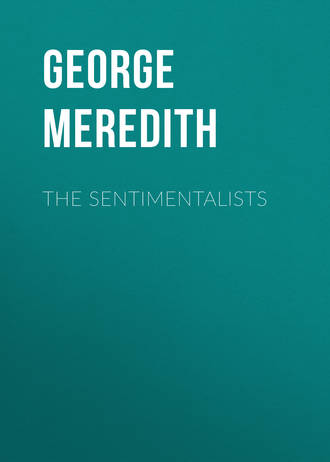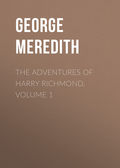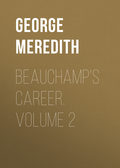
George Meredith
The Sentimentalists
LYRA: Mine?
ASTRAEA: You spoke warmly of him.
LYRA: Warmly, was it?
ASTRAEA: You are not blamed, my dear: he has a winning manner.
LYRA: I take him to be a manly young fellow, smart enough; handsome too.
ASTRAEA: Oh, he has good looks.
LYRA: And a head, by repute.
ASTRAEA: For the world's work, yes.
LYRA: Not romantic.
ASTRAEA: Romantic ideas are for dreamy simperers.
LYRA: Amazons repudiate them.
ASTRAEA: Laugh at me. Half my time I am laughing at myself. I should regain my pride if I could be resolved on a step. I am strong to resist; I have not strength to move.
LYRA: I see the sphinx of Egypt!
ASTRAEA: And all the while I am a manufactory of gunpowder in this quiet old-world Sabbath circle of dear good souls, with their stereotyped interjections, and orchestra of enthusiasms; their tapering delicacies: the rejoicing they have in their common agreement on all created things. To them it is restful. It spurs me to fly from rooms and chairs and beds and houses. I sleep hardly a couple of hours. Then into the early morning air, out with the birds; I know no other pleasure.
LYRA: Hospital work for a variation: civil or military. The former involves the house-surgeon: the latter the grateful lieutenant.
ASTRAEA: Not if a woman can resist . . . I go to it proof-armoured.
LYRA: What does the Dame say?
ASTRAEA: Sighs over me! Just a little maddening to hear.
LYRA: When we feel we have the strength of giants, and are bidden to sit and smile! You should rap out some of our old sweet-innocent garden oaths with her—'Carnation! Dame!' That used to make her dance on her seat.—'But, dearest Dame, it is as natural an impulse for women to have that relief as for men; and natural will out, begonia! it will!' We ran through the book of Botany for devilish objurgations. I do believe our misconduct caused us to be handed to the good man at the altar as the right corrective. And you were the worst offender.
ASTRAEA: Was I? I could be now, though I am so changed a creature.
LYRA: You enjoy the studies with your Spiral, come!
ASTRAEA: Professor Spiral is the one honest gentleman here. He does homage to my principles. I have never been troubled by him: no silly hints or side-looks—you know, the dog at the forbidden bone.
LYRA: A grand orator.
ASTRAEA: He is. You fix on the smallest of his gifts. He is intellectually and morally superior.
LYRA: Praise of that kind makes me rather incline to prefer his inferiors. He fed gobble-gobble on your puffs of incense. I coughed and scraped the gravel; quite in vain; he tapped for more and more.
ASTRAEA: Professor Spiral is a thinker; he is a sage. He gives women their due.
LYRA: And he is a bachelor too—or consequently.
ASTRAEA: If you like you may be as playful with me as the Lyra of our maiden days used to be. My dear, my dear, how glad I am to have you here! You remind me that I once had a heart. It will beat again with you beside me, and I shall look to you for protection. A novel request from me. From annoyance, I mean. It has entirely altered my character. Sometimes I am afraid to think of what I was, lest I should suddenly romp, and perform pirouettes and cry 'Carnation!' There is the bell. We must not be late when the professor condescends to sit for meals.
LYRA: That rings healthily in the professor.
ASTRAEA: Arm in arm, my Lyra.
LYRA: No Pluriel yet!
(They enter the house, and the time changes to evening of the same day. The scene is still the garden.)
SCENE VI
ASTRAEA, ARDEN
ASTRAEA: Pardon me if I do not hear you well.
ARDEN: I will not even think you barbarous.
ASTRAEA: I am. I am the object of the chase.
ARDEN: The huntsman draws the wood, then, and not you.
ASTRAEA:
At any instant I am forced to run,
Or turn in my defence: how can I be
Other than barbarous? You are the cause.
ARDEN: No: heaven that made you beautiful's the cause.
ASTRAEA:
Say, earth, that gave you instincts. Bring me down
To instincts! When by chance I speak awhile
With our professor, you appear in haste,
Full cry to sight again the missing hare.
Away ideas! All that's divinest flies!
I have to bear in mind how young you are.
ARDEN:
You have only to look up to me four years,
Instead of forty!
ASTRAEA: Sir?
ARDEN
There's my misfortune!
And worse that, young, I love as a young man.
Could I but quench the fire, I might conceal
The youthfulness offending you so much.
ASTRAEA: I wish you would. I wish it earnestly.
ARDEN: Impossible. I burn.
ASTRAEA: You should not burn.
ARDEN
'Tis more than I. 'Tis fire. It masters will.
You would not say I should not' if you knew fire.
It seizes. It devours.
ASTRAEA: Dry wood.
ARDEN:
Cold wit!
How cold you can be! But be cold, for sweet
You must be. And your eyes are mine: with them
I see myself: unworthy to usurp
The place I hold a moment. While I look
I have my happiness.
ASTRAEA: You should look higher.
ARDEN:
Through you to the highest. Only through you!
Through you
The mark I may attain is visible,
And I have strength to dream of winning it.
You are the bow that speeds the arrow: you
The glass that brings the distance nigh. My world
Is luminous through you, pure heavenly,
But hangs upon the rose's outer leaf,
Not next her heart. Astraea! my own beloved!
ASTRAEA: We may be excellent friends. And I have faults.
ARDEN: Name them: I am hungering for more to love.
ASTRAEA:
I waver very constantly: I have
No fixity of feeling or of sight.
I have no courage: I can often dream
Of daring: when I wake I am in dread.
I am inconstant as a butterfly,
And shallow as a brook with little fish!
Strange little fish, that tempt the small boy's net,
But at a touch straight dive! I am any one's,
And no one's! I am vain.
Praise of my beauty lodges in my ears.
The lark reels up with it; the nightingale
Sobs bleeding; the flowers nod; I could believe
A poet, though he praised me to my face.
ARDEN:
Never had poet so divine a fount
To drink of!
ASTRAEA:
Have I given you more to love
ARDEN:
More! You have given me your inner mind,
Where conscience in the robes of Justice shoots
Light so serenely keen that in such light
Fair infants, I newly criminal of earth,'
As your friend Osier says, might show some blot.
Seraphs might! More to love? Oh! these dear faults
Lead you to me like troops of laughing girls
With garlands. All the fear is, that you trifle,
Feigning them.
ASTRAEA:
For what purpose?
ARDEN:
Can I guess?
ASTRAEA:
I think 'tis you who have the trifler's note.
My hearing is acute, and when you speak,
Two voices ring, though you speak fervidly.
Your Osier quotation jars. Beware!
Why were you absent from our meeting-place
This morning?
ARDEN:
I was on the way, and met
Your uncle Homeware
ASTRAEA: Ah!
ARDEN: He loves you.
ASTRAEA:
He loves me: he has never understood.
He loves me as a creature of the flock;
A little whiter than some others.
Yes; He loves me, as men love; not to uplift;
Not to have faith in; not to spiritualize.
For him I am a woman and a widow
One of the flock, unmarked save by a brand.
He said it!—You confess it! You have learnt







